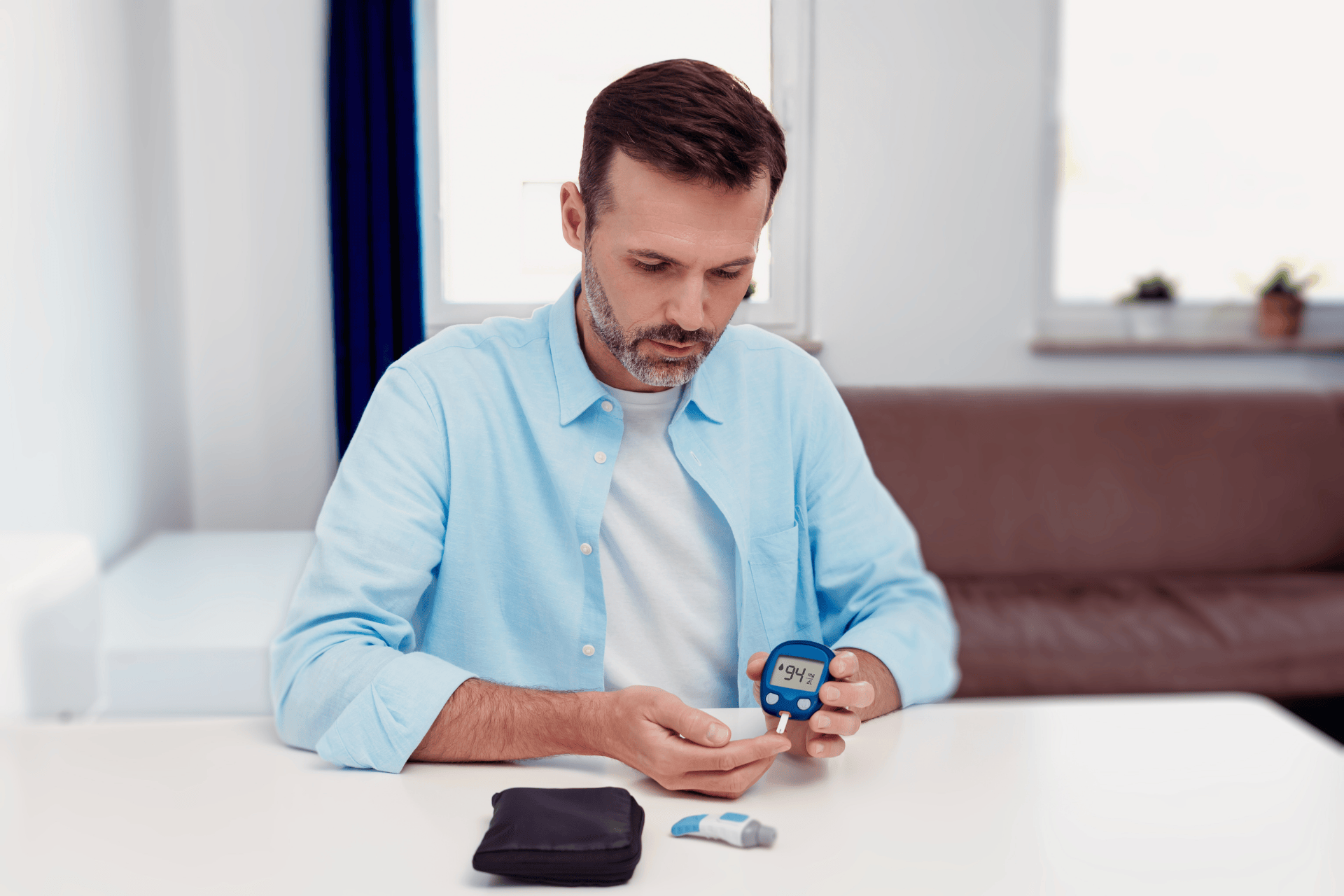Does Gabapentin Raise Blood Sugar?
If you take gabapentin and worry about how it might affect your blood sugar, you are not alone. Many people want to know if this common medication can cause blood sugar [...]
Read More
Medically reviewed by Alan Lucks | MD, Alan Lucks MDPC Private Practice - New York on November 13th, 2025.
Clinical studies in diabetic patients show no direct pharmacological mechanism by which gabapentin elevates glucose levels, unlike corticosteroids or certain diuretics.
Weight gain occurs in approximately 7-8% of patients taking gabapentin, typically 2-3 pounds within the first few months, which can indirectly affect glucose control.
The medication's sedating effects may reduce physical activity levels by 20-30% in some patients, potentially leading to higher blood sugar readings from decreased insulin sensitivity.
Starting doses of 300mg three times daily for diabetic neuropathy rarely cause metabolic changes, but doses above 1800mg daily require more vigilant glucose monitoring.
Patients can safely combine gabapentin with metformin, insulin, and other diabetes medications without drug interactions that would worsen glycemic control.
If you take gabapentin and worry about how it might affect your blood sugar, you are not alone. Many people want to know if this common medication can cause blood sugar levels to rise. Understanding how gabapentin works and its effects on your body can help you manage your health better.

Alt txt img:
Gabapentin is a medicine often prescribed for nerve pain, seizures, and sometimes restless leg syndrome. It works by calming nerve activity in the brain and nervous system. Doctors use it to help people who have conditions like shingles pain, epilepsy, or nerve damage from diabetes.
Because gabapentin affects the nervous system, it is natural to wonder if it also changes other body functions, like blood sugar control.
In addition to its primary uses, gabapentin has gained attention for its off-label applications. Many healthcare providers prescribe it to manage chronic pain conditions, such as fibromyalgia and neuropathic pain, which can be particularly challenging to treat. Patients with these conditions often report significant improvements in their quality of life, as gabapentin helps to alleviate persistent discomfort and allows for better mobility and daily functioning. Furthermore, researchers are exploring its potential benefits in treating anxiety disorders, as some studies suggest that gabapentin may help reduce symptoms of anxiety and improve overall mood.
It is important to note that while gabapentin can be effective for many individuals, it is not without potential side effects. Common side effects include dizziness, fatigue, and drowsiness, which can be particularly concerning for those who drive or operate heavy machinery. As with any medication, it is crucial for patients to discuss their medical history and any other medications they are taking with their healthcare provider to ensure gabapentin is a safe and appropriate option for their specific situation.
Current medical research shows that gabapentin does not directly raise blood sugar levels. It is not known to cause high blood sugar or diabetes. Most patients taking gabapentin do not experience changes in their blood sugar readings.
Some people have reported changes in appetite or weight while on gabapentin, which can indirectly affect blood sugar control, especially if you have diabetes or prediabetes. These changes can be particularly concerning for individuals who are already managing their blood sugar levels, as they may require closer monitoring and adjustments to their diabetes management plan.
Weight Gain: Gabapentin may cause weight gain in some users. Gaining weight can make it harder to manage blood sugar.
Changes in Appetite: Some people feel hungrier or eat more while taking gabapentin, which could lead to higher blood sugar if not managed well.
Fatigue and Activity Levels: Feeling tired or less active due to gabapentin side effects might affect how your body processes sugar.
These factors do not mean gabapentin raises blood sugar directly, but they can influence your overall blood sugar control. For instance, individuals who experience increased appetite may find themselves gravitating towards high-carbohydrate foods, which can lead to spikes in blood sugar levels. Additionally, the fatigue associated with gabapentin can discourage regular physical activity, further complicating blood sugar management.
Patients on gabapentin need to maintain open communication with their healthcare providers. Regular check-ups and blood sugar monitoring can help identify any potential issues early on. Furthermore, adopting a balanced diet and engaging in regular exercise can mitigate some of the indirect effects of gabapentin on blood sugar levels. By being proactive, individuals can better manage their health while benefiting from the therapeutic effects of gabapentin.
If you take gabapentin and are concerned about your blood sugar, here are some simple steps you can follow:
Monitor Your Blood Sugar: Check your levels regularly, especially if you have diabetes.
Watch Your Diet: Eat balanced meals with plenty of vegetables, lean proteins, and whole grains.
Stay Active: Try to move your body daily, even light exercise helps.
Talk to Your Doctor: Share any changes you notice in your appetite, weight, or blood sugar.
If your blood sugar starts to rise or you experience unusual symptoms like extreme thirst, frequent urination, or fatigue, contact your healthcare provider. These could be signs that your blood sugar needs better control.
For quick and easy access to medical advice, consider using Doctronic.ai. Their AI-powered doctor can provide personalized answers and guide you on managing your health.
In addition to these tips, it’s essential to understand how gabapentin can affect your body’s metabolism. Some individuals may experience changes in their appetite or weight, which can inadvertently impact blood sugar levels. Keeping a food diary can be beneficial in tracking what you eat and how it correlates with your blood sugar readings. This practice not only helps in identifying potential triggers but also encourages mindful eating habits.
Furthermore, consider incorporating stress management techniques into your daily routine. Stress can significantly impact blood sugar levels, often leading to spikes or drops. Activities such as yoga, meditation, or even simple breathing exercises can help maintain a calm state of mind. Engaging in these practices regularly can enhance your overall well-being and contribute positively to your blood sugar management while on gabapentin.
Gabapentin is generally safe for people with diabetes. It is often prescribed to treat diabetic nerve pain. Since it does not directly raise blood sugar directly, it can be part of your treatment plan.
Still, managing diabetes means keeping an eye on all factors that affect blood sugar, including medications, diet, and activity. Always discuss your full medication list with your healthcare provider.
Diabetic neuropathy causes burning, tingling, or numbness in the feet and hands. Gabapentin can reduce this pain by calming nerve signals. This relief can improve the quality of life and help people stay more active, which in turn supports better blood sugar control.
Managing medications and blood sugar often requires frequent check-ins with your doctor. Telehealth services like Doctronic.ai make it easier to get medical advice without leaving your home. You can have video visits with licensed doctors 24/7, which is convenient and affordable.
Doctronic’s AI doctor also offers free AI visits that provide quick answers based on the latest medical research. This can help you understand your symptoms and treatment options before talking to a live doctor.
 How to Prepare for a Telehealth Visit
How to Prepare for a Telehealth VisitWrite down your symptoms and questions.
Have your medication list ready.
Check your recent blood sugar readings.
Find a quiet place with good internet for the video call.
Gabapentin does not directly raise blood sugar levels.
It may cause weight gain or appetite changes that can affect blood sugar control.
People with diabetes can use gabapentin safely but should monitor their blood sugar closely.
Maintaining a healthy lifestyle helps manage any indirect effects on blood sugar.
Telehealth services like Doctronic.ai provide easy access to medical advice and support.
No, gabapentin does not cause diabetes. It does not directly affect blood sugar or insulin production.
Do not stop gabapentin without talking to your doctor. If you notice changes in your blood sugar, your doctor can help adjust your treatment safely.
Keep track of your blood sugar readings and any changes in appetite or weight. If you see consistent increases, discuss this with your healthcare provider.
Your doctor can recommend the best treatment based on your health. Gabapentin is commonly used and effective, but alternatives exist.
Yes, Doctronic.ai offers AI-powered visits and telehealth video visits with doctors who can answer questions about gabapentin and blood sugar management.
Gabapentin remains a first-line treatment for diabetic neuropathy because it doesn't directly interfere with blood sugar regulation. Monitor your glucose levels more frequently during the first 2-3 months to catch any indirect effects from appetite or activity changes. If you're experiencing nerve pain symptoms, Doctronic can help determine if gabapentin is right for your diabetes management plan.
If you take gabapentin and worry about how it might affect your blood sugar, you are not alone. Many people want to know if this common medication can cause blood sugar [...]
Read More